Did you know that the number one way swimming pools lose water is through evaporation? According to the Department of Energy, 70% of water loss in pools and spas is through evaporation. Of course, you also have leaks- which probably accounts for the second reason. But, how can you tell the difference? How do you prevent swimming pool evaporation?
Are you losing water because of everyday science or are you losing water because you have a leak somewhere? Honestly, both answers warrant an explanation, don’t you think? Let’s dig a little deeper.
Losing Water Through Evaporation
Everyone knows that evaporation is just the process of liquid forming into vapor. But, how does that fit in with our swimming pool? Evaporation occurs whenever you expose wind or air to the surface of your pool. So in short, this applies to every pool, all the time. Water molecules rise to the surface, form into a vapor and eventually get released into the air.
Heated pools on cool nights experience evaporation more rapidly. This is also why heated pools lose most of their heat overnight. Luckily for us, there are ways to fight evaporation.
Cover Your Pool and Spa
The best way to prevent evaporation is by purchasing a pool cover. According to a study by the National Pool Industry Research Center (NPIRC), pool owners can save a considerable amount in water savings by covering their outdoor swimming pools.
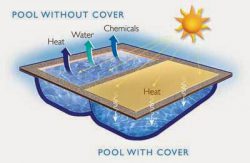
In fact, pool covers can reduce evaporation by 95%! Honestly, that alone is enough proof for me to consider purchasing a pool cover. However, there are other benefits to adding a cover to your pool.
In addition to preventing pool evaporation, pool covers also keep the warmth inside your pool. I mentioned earlier that when you’re losing water via evaporation, you’re also losing a lot of the heat generated by your heater or heat pump. The cover traps the heat inside the pool and reduces the energy demand on your pool equipment. Additionally, owning a pool cover reduces the number of chemicals you’re using, reduces the debris in your pool, and reduces the amount of time you operate your pump and filter.
Keep in mind, there are several different covers you can purchase for your swimming pool. Here is some more information on the types of covers and their benefits.
The 3 Cover Types for Above Ground Pools

Turn Your Pool Water Features OFF
I love pools that have extra cool features like waterfalls and jets. However, if you want to help prevent pool evaporation, we recommend turning them off from time to time. Waterfalls and jets increase the amount of water exposed to sun and air. As a result, they are also more prone to evaporation. Laminar jets or cascading waterfalls have the greatest chances of higher evaporation.
We recommend turning your water features off, especially when they are not in use. This can save you money on water and on chemicals. Of course, when you’re ready to entertain guests again, turn those babies on again.
Lower Your Water Temperature
As we know, warmer water evaporates at a faster rate than cooler water because the molecules are moving faster. As the temperatures drop, the warm water evaporates even faster. In warm water, molecules turn into mist, which evaporates quickly. This process accelerates when the temperature of the pool water is higher than the air’s temperature.
Cold water is more resistant to evaporation. Keep this in mind if you’re trying to prevent evaporation and save money on water.
How Can You Tell If You’re Losing Water From Evaporation?
One sure way to determine whether your pool is losing water from evaporation or from a leak is to perform a water bucket test. To perform a bucket test, complete the steps below.
- Fill your pool to its normal level. Using a standard bucket, fill it to 1 inch from the top with pool water.
- Place the bucket in the pool at about five inches. You can set it on the first or second step of your pool.
- Mark the water level inside the bucket and the water level outside the bucket. (You can use a marker or piece of tape)
- Return after 24 hours to compare the inside water level on the inside to the water outside.
If the water level outside of the bucket dropped more than the water level inside of the bucket, then you likely have a pool leak. At this point, we recommend calling a professional.
.
Make sure to check the bucket at the 24-hour mark to avoid inaccurate results. If it rains, wait until it stops to perform the test. It will obviously give you inaccurate results, as well.
Remember, losing water to evaporation is normal- until it isn’t. Purchasing a swimming pool cover is the ideal method to prevent swimming pool evaporation. Not only does it prevent water from escaping your pool, it also traps any heat your heater or heat pump generates.
If you’re losing more water than you think evaporation allows for, perform a water bucket test. The bucket test is the easiest and cheapest trick homeowners have available.

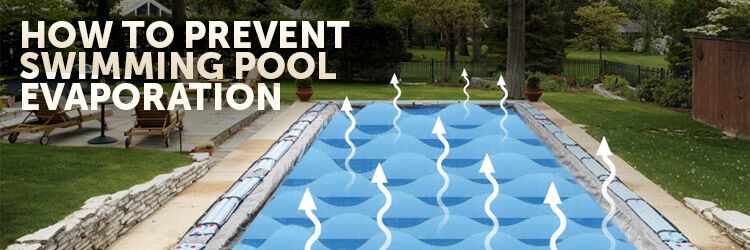

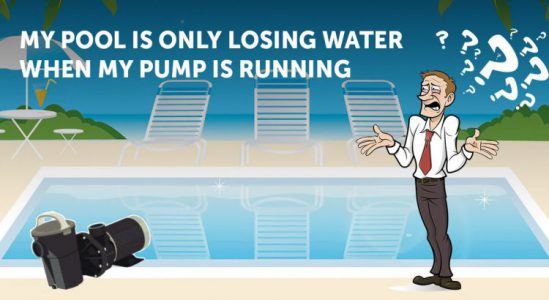
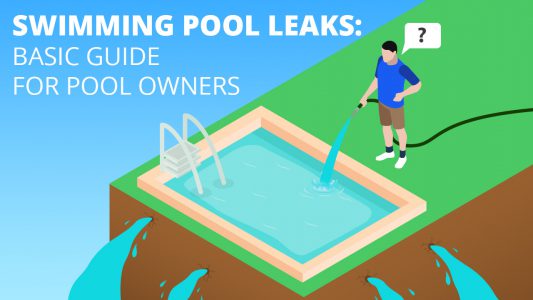
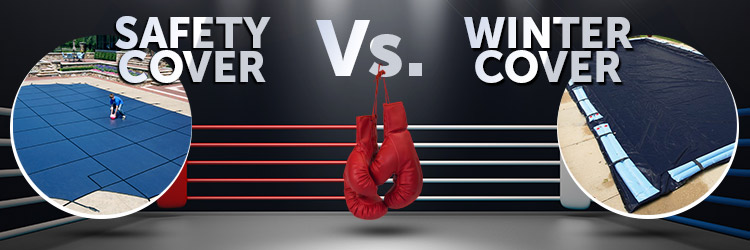






Hi I have a pool cover on but its loosing water fast…It has holes in for water to go inside if it rains can it be that? Or do I have a leak and how do i find the leak?
How much water do you lose in a day? Depending on how quickly the water is lost, you may be dealing with a plumbing issue instead of cover problems.
Question: I am looking for a way to reduce the amount of evaporation that occurs over the winter months. I switched from a heavy winter cover to a more lightweight one several years ago, and I’m sure that’s part of the cause. (My winter cover is so stinky I throw it away every spring and don’t want to throw away a pricey heavy weight one- the light weight is disposable in my opinion) So I’m wondering if I could add another layer of protection, such as perhaps leaving my solar cover on the pool under the winter cover since a solar cover reduces evaporation. Or perhaps I could do two light weight winter covers and every year toss the yucky one. Thoughts? (Above ground pool, 14 x 28, 10,000 gallons) Thanks in advance for you thoughts
I’d look into one of the liquid pool cover products. These products dispense a liquid that creates a thin chemical boundary over the surface of the water that slows down evaporation.
If the pool is closed, why are you concerned with evaporation?
Because in spring when I open it, it’s down a good 18 inches (and costs 200 + bucks to top off) It would cost more if I did it from my hose BTW.
Rita, I am not an expert but that sounds clearly like a leak to me. You surely should have no evaporation of any significance with a cover?
Anyone have little nicks or irregularities in your pool that tend to attract algea? I have a few where the walls meet the floors. I don’t have algea issues but will see some green in these nicks as they can’t be brushed easily. How have you repaired these? Caulk? Add concrete or plaster in the off season to smooth it out?
Pools can form circulation dead spots, where the flow of freshly chlorinated water just kind of dies off, leaving a corner of your pool (or wherever) with stagnant water. You can try adjusting the return jet nozzle to get the water churning a little better in that area
I would make a point to brush trouble spots more often to prevent algae from getting a foothold.
Hi ..your advice was a revelation !..For years ..more like decades ..I thought our pool was leaking . I replaced spider gaskets , multi port valve springs …provided new shut off values on the wastes.. did dye traces and bucket tests..all to no avail ..then I read your advice on the causes of evaporation …YES we do have a waterfall water feature and I turned it off .. and guess what ..THE WATER LEVEL DIDN’T GO DOWN ! ..Its been like that for over a month. I relaid this to my pool shop guy and he gave smile ..the secret is out!…thanks heaps for your advice ..Brighton Victoria Australia
I have a 8m x4m saltwater pool with a retractable enclosure and a heat pump. Enclosure is polycarbonate so virtually no insulation. Evaporation is so bad (5” per day) I think I may have a leak. If water is 28c and outside is 5c at night and 15c in the day, what should evaporation be? So much water hangs under the enclosure it is constantly dripping (mainly back into the pool, I would have thought?) There are some air leaks but not too bad.
Just going by your units of measure, you probably are not in the US; but even if you are in Tunisia 5″ inches is too high. The high evaporation rate is likely due to the difference in water and air temps. When warm water hits cool air, evaporation rates increase. How much does it increase by? Don’t know exactly, but probably not enough to cause 5 inches of water loss a day. You may want to look into getting a solar blanket to prevent evaporation.
I lose about an inch a day with no cover on in Chicago for a 18×36 pool. This is usually late summer with cool nights. When its hot at night in July, I lose maybe 1/4 inch a night.
I’ve also cut my cover into 3 stips and affixed them to pvc pipe on each end. I just roll them open and closed as needed. Works great as I can’t fit an automatic cover due to a slide and landscaping.
David, I live in Tucson, AZ. Sounds like we have similar problems with shape of pool and space. Would you mind sending me a picture of your setup. I would like to see if it would work in my application. Thanks
I know this is an old thread. I just had an 18×36 installed in Buffalo, NY 2 weeks ago. I put the heater on and cranked it up to 80 so kids could get a swim or two in before closing it right away. Then the temps dropped to mid 40’s that night and mid 50’s the next day. I lost like 2 inches in a day. I was worried I had a leak but a 30 degree difference in temp and no cover I guess would cause that with evaporation alone. Since you see an inch without that extreme difference and regular use.
I can’t imagine I have a leak on a brand new pool.
Pool company isn’t worried but I can’t help but to worry after such a large investment.
I agree with your pool company, the water loss is likely down to the difference in the air and water temperatures. I’m sure they have gotten this type of call from a few new pool owners who have experienced similar drops in water levels.
But as always keep an eye on it, you can never be too sure.
We will be on vacation for a couple of weeks and will take the solar cover off for the convenience of our pool guy.
What about running the pool filter in the evening for say 4 hours after sunset to slow down the evaporation process?
That may work, but I haven’t actually tested it.
Running your filter at night would agitate the water making it easier for the heat to escape (and water to evaporate),
As a person that ownes a business cleaning and maintaining pools, It would be a great gesture to remove the cover before your pool cleaning person arrives. Also another thought. When you keep a cover on the pool and a lot of debris settles on top and then removing the cover can also be a real hassle for us cleaning folk. Just sayin.
Both are fair points.
By all means, let me help you clean up my pool, that I’m paying YOU to clean. Really?
I have an automatic water fill. I rather just have the pool and enjoy it and never worry about a cover
Remember when it rains it fills your pool.The process basically balances out over the season.
That may be the case in Florida, Louisianna and other rainier states, but what about Arizona, Texas, New Mexico? Your reasoning doesn’t hold water, pun intended.
I live in metro Houston and I just read where we are the 8th ranked large city for rainfall. I probably pump more water out of my pool than I put in it. What I really need is how to get a 500 lb block of ice into it in mid-July 😒
Let us know if you figure it out. Bath temperature water in the pool is no good.
I have a homemade solar heater and on the occasion when it gets too hot, I run it at night and it helps to dissipte the heat
Highly recommend adding a fountain for your case. There are a few stiles online that are $20-$30 if you already have a booster pump. This will increase evaporation to get rid of your issue with needing to pump water out, and will drop your water temp by 10+ degrees.
That’s not true. The rain in Indiana as usually acid rains with no calcium, so unless you start with a pool that is very alkaline and high calcium, your pool will only become more corrosive over the season.
Has anyone had success with using multiple small solar covers? Should be easier to take on and off.
This would be something similar to Solar Sun Rings; which were just a bunch of small round solar blankets. They worked ‘ok’ but their design left a lot of gaps. As long as you get a few solar blankets that fit well to eliminate gaps for heat to escape, it should work.
How about liquid solar cover ? Does anyone use this , and does it work ?
Bill,
I haven’t yet used the liquid solar cover but I have heard some positive remarks about it.
Although Liquid Solar Blanket doesn’t work as well as a solar blanket, it is very effective.
I have read that it gets sucked down the skimmer, that wind blows it to the side, that it can leave a sort of oily ring round the pool and that bugs die in it.
We are working on a review of liquid solar blankets at the moment. I am looking forward to the findings, as I don’t have much experience with liquid solar blankets either.
Totally agree. The same thing hold true to removing a solar cover daily in a free form type pool which cannot be put on a reel. It takes two people. It deters you from using the pool. Losing water and especially heat is the price you pay when you have a pool in a part of the country that has cooler nights, (which is most of our swimming season).
I have a freeform pool and a solar cover on a reel. It takes less than 5 min to remove and just a little longer to put back on.
The only downside is the water can get too hot in the middle of the summer but it’s made a huge difference in my water loss.
I can take my solar cover off by myself. And put it back on. I’ve got lots of pool years under my belt.
Lol, yuup,
putting on a solid cover with 25 x 8′ water bags around its perimeter every night to deter evaporation
and then removing them and storing them every morning until putting the cover back on at night kind of takes the fun out of owning a pool
ROCCO , just buy an automatic pool cover 😉
Try Liquid Solar Blanket. It doesn’t work quite as well as a solar blanket, but it’s a lot easier and does a pretty good job.
No one would do that amount worth each day.
You apparently don’t understand the importance of covers & since I swim outside all winter long in -10 or 15 degrees you would quickly understand that need for covers & warm water. I guess you must be rich too with the huge heating costs u must endure.